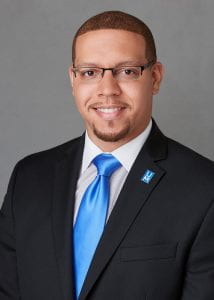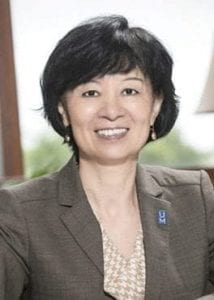Diversity, equity, and inclusion as the value of nursing requires intentional commitment. To diversify the nursing workforce, the College has focused its efforts to recruit, retain and support students from disadvantaged backgrounds.
Chermale Casem, the Director of Strategic Partnerships, has been instrumental and worked with Drs. Bailey and Zhan on two diversity focused grants for students from disadvantaged backgrounds. Supporting the Retention of Next Generation Registered Nurses (STRONG RNs) project was created thanks to a $3.24 million, five-year Health Resources and Services Administration (HRSA) grant led by Dr. Eric Bailey II, Assistant Dean for Students, and Rural Nurses Leading Eldercare Advancement through Diversity (RNs LEAD) project led by Dr. Zhan was made possible because of an almost $1 million, two-year HRSA grant.
Supporting the retention of next generation registered nurses (STRONG-RNs) was created in response to the lack of diversity in the nursing workforce. Its goal is to diversify the overall nursing workforce by lessening the financial burden of students from minority and disadvantaged backgrounds. The program model includes five major components: pre-entrance preparation, academic support, social support, financial support, and professional development. Recipients of this scholarship are eligible to receive up to $18,000 per year to cover tuition and living expenses.
“About 90% of the state of Tennessee’s 95 counties have been fully or partially designated by HRSA as Medically Underserved Areas. By increasing the number of disadvantaged students, including underrepresented minority students, who graduate from our BSN program, pass the NCLEX-RN and practice in Tennessee will respond to the need for a more representative workforce and improved access to culturally competent healthcare for underserved populations,” said Dr. Bailey.
RNs LEAD focus focuses on transforming the healthcare workforce by addressing lack of diversity in the workforce, evidenced-based barriers to matriculation encountered by disadvantaged nursing students and the limited basic training in the care of older adults for nurses in rural areas. The program increases the recruitment and retention of students from disadvantaged backgrounds, enhances didactic and clinical training curriculum through the systematic integration of the care of elderly populations in rural and underserved areas across the BSN program and delivering continuing professional development for Registered Nurses, clinical preceptors and faculty with an emphasis on eldercare. Students who participate receive up to $16,000 per year for tuition and a living stipend.
“An increase of aging population with existing health inequity in rural and underserved areas, academic nursing must prepare graduates with essential knowledge, skills, and attitude for providing competent eldercare. This grant funding helps us integrate enhanced eldercare education emphasizing social determinants of health, rural health, elderly population health across undergraduate curriculum,” Dr. Zhan, PI of the RNs LEAD Funded Project.
HRSA funded resources will increase the recruiting, retention and graduation rates of disadvantaged nursing students and those who wish to work with the medically underserved.
“Diversity in the nursing field is essential because it provides opportunities to administer quality care to patients,” Casem said about the importance of building diversity in healthcare. “When the nursing workforce reflects its patient demographic, communication improves thus making patients feel more comfortable. If you have nurses who understand their patient’s culture, environment, food, customs, religious views, and so on, they can provide their patients with ultimate care.”
According to Casem, the focus of these two programs is important because having more diverse healthcare professionals leads to positive patient outcomes. Racial and ethnic minorities have higher rates of poor health outcomes than white people in the case of disease, even when income, employment status and insurance coverage are controlled. Cultural bias is one contributor to this, according to the Institute of Medicine (IOM) Report, “Unequal Treatment: Confronting Racial/Ethnic Disparities in Health Care.”
“Racial and ethnic minorities, notably African Americans and Hispanics/ Latinos, are presently underrepresented in the nursing workforce, as well as in many health occupations. Building a more diverse and culturally competent healthcare workforce would help reduce systemic disparities that exist,” she said.






